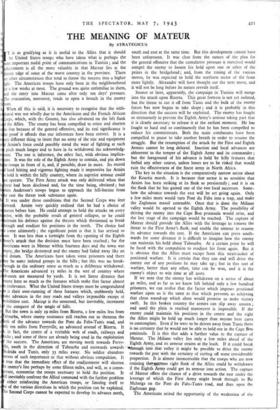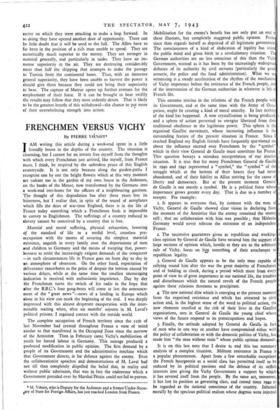THE MEANING OF MATEUR
By STRATEGICUS T is as gratifying as it is useful to the Allies that it should be United States troops who have taken what is perhaps the ost important nodal point of communications in Tunisia ; and the chievement is all the more valuable in that Mateur lies at the bunt edge of some of the worst country in the province. There re other circumstances that tend to throw the success into a higher
ght. The American troops have only been in the neighbourhood or a few weeks at most. The ground was quite unfamiliar to them, nd the entry into Mateur came after only ten days' pressure.
he evacuation, moreover, tends to open a breach in the enemy rant.
When all this is said, it is necessary to recognise that the with- rawal was not wholly due to the Americans and the French African
rps, which, with the Goums, has also advanced on the left flank f the Allies. The enemy has been compelled to retire and shorten
is line because of the general offensive, and its real significance is
he proof it affords that our inferences have been correct. It is a try different thing to insist that no army of the size and equipment
f Arnim's force could possibly stand the wear of fighting at such
pitch much longer and to have in its withdrawal the acknowledg- ent. The one is inference, the other fact, with obvious implica- ions. It was the role of the Eighth Army to contain, and pin down
he troops in front of it, and, if possible, draw in more. Its record
f hard hitting and vigorous fighting made it imperative for Arnim hold it within the hilly country, where its superior armour could of operate. The First Army attack was only delivered when that hreat had been disdosed and, for the time being, obviated ; but hen Anderson's troops began to approach the hill-barrier from e east the threat took substance again.
It was under these conditions that the Second Corps was sent rward. Arnim very quickly realised that he had a choice of ourses before him. He could attempt to hold the attacks on every ctor, with the probable result of general collapse, or he could
aintain his defence against the thrusts which threatened to break
rough and readjust his positions in the north. The choice had come ultimately ; the significant point is that it has arrived so oon. It was less than a fortnight from the opening of the Eighth
rmy's attack that the decision must have been reached ; for the mericans were in Mateur within fourteen days and the town was mpty, the bridge destroyed and the enemy had faded away like an
vil dream. The Americans have taken some prisoners and there y be some isolated groups in the hills ; but this was no break- rough in the ordinary sense so much as a deliberate withdrawal.
e Americans advanced 15 miles in the sort of country where dvances are measured by yards. It is not linear distance that aunts here so much as the features which make that factor almost n irrelevance. What the United States troops must be congratulated n is their over-running of these features which, stubbornly held, ake advances in the rare roads and valleys impossible except at rohibitive cost. Mateqr is the unearned, but inevitable, increment the conquest of the tangle of hills.
But the town is only 19 miles from Bizerta, a few miles less from abourba, where enemy resistance still reaches out to threaten the
ank of the advance towards the Pont du Fahs-Tunis road, and my ten miles from Ferryville, an advanced arsenal of Bizerta. It in fact, the centre of a veritable web of roads, railways and acks ; and some of these are already being used in the exploitation the success. The Americans are moving north towards Ferry- Ile, south in the direction of Tabourba and eastwards towards
edeida and Tunis, only 33 miles away. No soldier abandons ntres of such importance as that without obvious compulsion. It
true that the immediate effect of the readjustment will shorten e enemy's line perhaps by some fifteen miles, and will, as a conse-
uence, economise the troops necessary to hold the position. It III inevitably confront the Allied command with the further problem
either reinforcing the American troops, or limiting itself to e of the various directions in which the position can be exploited. e Second Corps cannot be expected to develop its advance north,
south and east at the same time. But this development cannot have been unforeseen. It was clear from the nature of the plan for the general offensive that the cumulative pressure it exercised would compel the enemy to loosen his hold upon one or other of the prizes in the bridgehead; and, from the timing of the various moves, he was expected to hold the northern sector of the front more lightly. Alexander will have thought out the next move, and it will not be long before its nature reveals itself.
Sooner or later, apparently, the campaign in Tunisia will merge into the attack upon Bizerta. This great fortress is not yet isolated, but the threat to cut it off from Tunis and the bulk of the enemy forces has now begun to take shape ; and it is probably in this direction that the success will be exploited. The enemy has fought so strenuously to prevent the Eighth Army's armour taking part that it is clearly necessary to release it at the earliest moment. He has fought so hard and so continuously that he has been compelled to reduce his commitments. Both the main combatants have been compelled to pause to take another breath in order to resume the struggle. But the resumption of the attack by the First and Eighth Armies cannot be long delayed. Inaction and local advances are abhorrent to the temper of the Eighth Army and its commander ; but the foreground of his advance is held by hilly features that forbid any other course, unless losses are to be risked that would ruin the effectiveness of the finest army in North Africa.
The key to the situation is the comparatively narrow sector about the Keurtia marsh. It is because that sector is so sensitive that Arnim has been striking at its flank so persistently ; and it is on the flank that he has gained one of the two local successes. Some- how the advance towards the east will be set going again. Only a few miles more would turn Pont du Fahs into a trap, and make the Zaghouan massif untenable. Once that is done the Miliane valley would be opened to the Eighth Army. The possibility of driving the enemy into the Cape Bon peninsula would arise, and the last stage of the campaign would be reached. The capture of Mateur should provide the Allies with the leverage to remove the threat to the First Army's flank, and enable the armour to resume its advance towards the east. If the Americans can press south- wards for some distance it is difficult to imagine how the enemy can maintain his hold about Tabourba. At a certain point he will be faced with the compulsion to readjust his front again. But it is obvious that the Allies must escape from this strait-jacket of positional warfare. It is certain that they can and will drive the enemy out of any positions he may take up ; but in this sort of warfare, better than any other, time can be won, and it is the enemy's object to win time at all costs.
If we note that the enemy has withdrawn on a sector of about act miles, and as far as we know left behind only a few hundred prisoners, we can realise that the factor which imposes positional warfare upon us is the same as that which prevents us achieving that clean round-up which alone would promise to make victory swift. In this broken country the armies can slip away unseen ; and until the plain is reached manoeuvre is impossible. If the enemy could maintain his positions in the centre and the right the Allies might be held up much longer than anyone here cares to contemplate. Even if he were to be driven away from Tunis there is no certainty that he would not be able to hold out in the Cape Bon peninsula. It is this that adds a further value to the capture of Mateur. The Miliane valley lies only a few miles ahead of the Eighth Army, and its armour strains at the leash. If it could break othrough into that valley it might be possible to drive the enemy towards the past with the certainty of cutting off some considerable proportion. It is almost inconceivable that the troops who are now resisting th exetagreme right flank of the Allies could be withdrawn if the Eighth Army could get its armour into action. The capture of Mateur offers the chance of a drive towards the east under the leverage of which the First Army might break through to Bir Mcherga on the Pont du Fahs-Tunis road, and thus open the Zaghouan gap.
The Americans seized the opportunity of the weakening of the sector on which they were attacking to make a leap forward. In so doing they have opened another door of opportunity. There can be little doubt that it will be used to the full. The Allies have so far been in the position of a rich man unable to spend. They are numerically much superior to the enemy. They are stronger in material generally, and particularly in tanks. They have an im- mense superiority in the air. They are destroying considerably more than half the shipping that attempts to make the passage to Tunisia from the continental bases. Thus, with an immense general superiority, they have been unable to harvest the power it should give them because they could not bring their superiority to bear. The capture of Mateur opens up further avenues for the employment of their force. If it can be brought to bear swiftly the results may follow that they most ardently desire. That is likely to be the greatest benefit of this withdrawal—the chance to put more of their overwhelming strength into action.



























 Previous page
Previous page